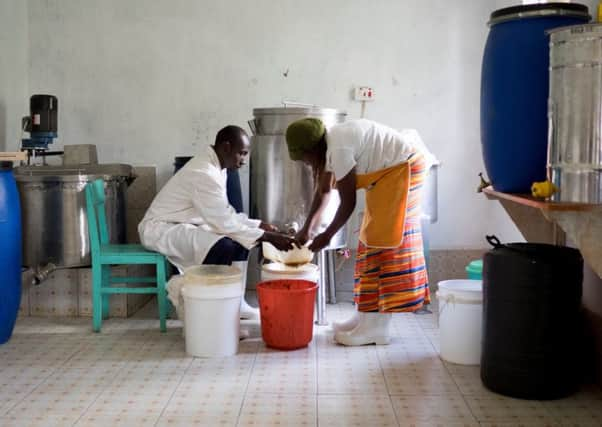Nadia Cunden: Hives of industry the surest hope of conquering poverty


Eighty per cent of land in Kenya is suitable for beekeeping. But until ten years ago most of Kenya’s honey came across the border from Tanzania as Kenyan honey yields were very poor.
Over the past ten years, Christian Aid has been testing pioneering approaches to tackling poverty in over 20 countries. The programme, called In Their Lifetime (ITL), has directly impacted the lives of tens of thousands of women, men and children around the world. In Kenya, ITL ambitiously set out to restructure the Kenyan honey sector and provide small-scale producers, like Mary, with profitable and resilient livelihoods.
Advertisement
Hide AdAdvertisement
Hide AdPoverty is exacerbated when the world’s poorest people do not have access to markets where they can sell their produce, when they live in a climate of fear, and when gender equality is not valued.
Most people in developing countries work in small, family-run farms. Trade could be their route out of poverty, but poor producers struggle to get a decent price for their goods. Their limited access to finance or technical expertise restricts productivity and quality. With hardly any access to transport, processing or storage facilities, and limited business knowhow, they are unable to reach markets beyond their immediate area. ITL projects support beekeepers in Kenya and hibiscus growers in Nicaragua to boost productivity and quality, reach new markets and secure better prices. By encouraging entrepreneurship, otherwise marginalised women and men can be supported to find a sustainable route out of poverty.
Christian Aid in Kenya set up a partnership with a private company and established hubs where farmers could buy beehives and then bring and sell their honey. The hubs became a central point for training farmers in beekeeping and providing access to specialist machinery for pasteurising and preparing the honey for sale.
Very quickly, the beekeepers were able to buy more beehives and produce more honey which they then sold at a profit. Some farmers earned enough money to pay for their children’s school fees, purchase more nutritious food and build homes. But a fundamental shift was needed to make that improvement long-lasting. And in January 2018, thanks to generous donations from ITL donors in Scotland and the UK, a new social enterprise, Nyuki Hubs, was established.
Nyuki Hubs commissioned a local supplier to manufacture significantly more affordable modern hives. The enterprise buys the honey from farmers in bulk, processes and packages it and then sells it on to buyers. These previously marginalised and impoverished farmers are offered a fixed price for their honey, now affording them the means to plan for the future.
Over the past 10 years, ITL has provided a unique testing ground to develop an advanced approach to inclusive markets in communities across the world. There are significant examples of true innovation such as when a drought-resistant cocoa plant was tested and grown in Nicaragua. But this programme would not have seen the light of day were it not for a small pool of daring and committed supporters.
By standing together through the opportunities and challenges of these cutting-edge projects, supporters in Scotland and local partners in countries like Nicaragua and Kenya commit themselves to Christian Aid’s core vision. Together we can eradicate extreme poverty, dismantle its root causes across the world and enable the voice and agency of the poor and marginalised to be fully realised.
Christian Aid is showcasing some of these ground-breaking projects with the “In Their Lifetime – Celebrating 10 years of ground-breaking work” photography exhibition at the Scottish National Storytelling Centre, High Street, Edinburgh. The exhibition will be open until the 28th September.
Nadia Cunden is Philanthropy Officer for Christian Aid Scotland